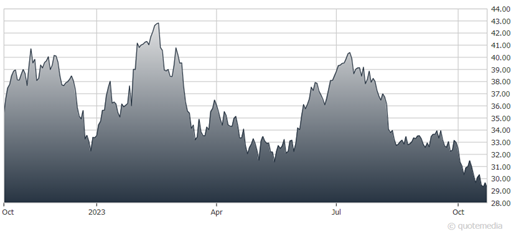Despite some “Black Monday” chatter over the weekend, stocks only retreated modestly yesterday – and they’re bouncing back today. Gold and silver are weaker, while the dollar is stronger. Treasuries and crude oil are flat.
On the news front...
The balance of power has been shifting between employers and employees, with the latter more emboldened now to ask for – or demand – higher compensation and benefits. Now, that’s hitting home on Wall Street. While automaker General Motors (GM) reported better-than-expected third-quarter profit this morning, it yanked its $14 billion full-year forecast on account of the United Auto Workers (UAW) strike.
General Motors (GM)
The company estimated the strike has cost it $800 million so far, with $200 million-per-week in additional costs piling up. The union action is currently in its sixth week.
Economists keep getting things wrong. That’s the gist of this story, which notes how mainstream forecasters were wrong about inflation being “transitory” in 2021...wrong about inflation fading in 2022...and wrong when saying Federal Reserve rate hikes would push the economy into recession in 2023.
Experts quoted in the piece lay the blame on underappreciated changes the economy underwent during and after COVID, a lack of top-quality data, and the underestimated staying power of fiscal stimulus. As someone reminded me recently, Bloomberg’s story saying the economy had a 100% chance of recession in the next year was published...just over a year ago. Still nothing on that score!
We all know interest rates are rising – and you read right here that the 10-year breached 5% before an intraday reversal lower. But what does that MEAN for the economy? This Wall Street Journal story covers the many ways that higher “benchmark” yields like the 10-year impact the cost of borrowing for consumers, businesses, and even the US government.










